Loss
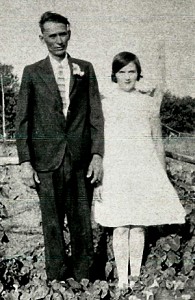
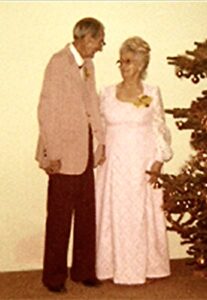 My grandmother, Harriet “Hattie” Byer, was a tiny woman, who loved kids, and had nine of them with my grandfather, George Byer. Grandpa worked hard, and he was a soft-hearted man. I’m sure he spanked his kids, but not very much. Grandma was the disciplinarian of the family, and I’m telling you, she might have been small in stature, but my grandma was a powerhouse!! She had a heart of gold, but she just didn’t take any guff. Don’t get me wrong, my grandparents’ home was filled with love and respect. During chores, there would usually be singing and much laughter. Grandma kept the atmosphere light and happy. My aunts and uncles always knew that they were loved. They also, knew that theirs was not to interfere when Grandma was disciplining one of your siblings. She would quickly turn on the one sassing her while she disciplined their sibling.
My grandmother, Harriet “Hattie” Byer, was a tiny woman, who loved kids, and had nine of them with my grandfather, George Byer. Grandpa worked hard, and he was a soft-hearted man. I’m sure he spanked his kids, but not very much. Grandma was the disciplinarian of the family, and I’m telling you, she might have been small in stature, but my grandma was a powerhouse!! She had a heart of gold, but she just didn’t take any guff. Don’t get me wrong, my grandparents’ home was filled with love and respect. During chores, there would usually be singing and much laughter. Grandma kept the atmosphere light and happy. My aunts and uncles always knew that they were loved. They also, knew that theirs was not to interfere when Grandma was disciplining one of your siblings. She would quickly turn on the one sassing her while she disciplined their sibling.
Evenings would find the family sitting in the living room mesmerized by whatever story Grandma was reading to them that night. Grandma worked so hard, and sometimes it was hard for her to stay awake while reading the evening’s story. Every time she would doze off, the kids would wake her up with calls to read on. Sometimes she just kept on sleeping, and on those days, Grandpa just had to close the book and tell the kids they would hear more the next night. Grandma worked so hard, and for that night, she needed to sleep, and do no more reading.
Grandma was a beautiful woman. She and Grandpa made beautiful children. Every year, we are amazed at how much the family has grown. My guess would be, that Grandma and Grandpa now have over 600 descendants…and counting. When we hit 200, Grandpa said, “Look what we started, Mommy!” He was surprised then. Just imagine what he would think now. Every time I mention an aunt, uncle, or cousin, people say, “Which one?? You are related to 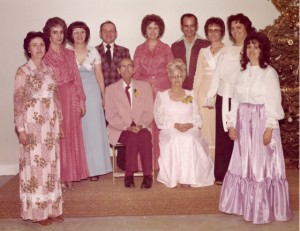
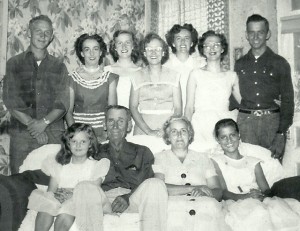 half the town!!” Well…yes, that is very likely true…and I have my sweet grandparents to thank for it all. We are not only a large family…we are a very blessed family. And it all started, when my grandfather saw this beauty of a girl, and never looked back. It was love at first sight. Today is the 115th anniversary of my grandmother’s birth. Happy birthday in Heaven, Grandma Byer. We love and miss you very much.
half the town!!” Well…yes, that is very likely true…and I have my sweet grandparents to thank for it all. We are not only a large family…we are a very blessed family. And it all started, when my grandfather saw this beauty of a girl, and never looked back. It was love at first sight. Today is the 115th anniversary of my grandmother’s birth. Happy birthday in Heaven, Grandma Byer. We love and miss you very much.
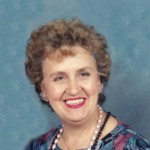
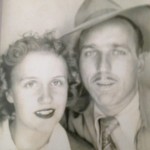 With every passing year, I find myself wondering how it could have been nine years since my mom, Collene Spencer, left us to go to Heaven. Like she lived her life, my mom went out in her own time, and in her own way…on her own terms. I’m sure that you have heard about having a bucket list. Well, my mom had her own kind of bucket list. After my dad, Allen Spencer graduated to Heaven on December 12, 2007, Mom told us that she was going to stay. I don’t know if she thought we thought she would just give up, and maybe we did to a degree, but she told us that she missed Dad very much, but she felt that she had more to give and that there was more life for her to live.
With every passing year, I find myself wondering how it could have been nine years since my mom, Collene Spencer, left us to go to Heaven. Like she lived her life, my mom went out in her own time, and in her own way…on her own terms. I’m sure that you have heard about having a bucket list. Well, my mom had her own kind of bucket list. After my dad, Allen Spencer graduated to Heaven on December 12, 2007, Mom told us that she was going to stay. I don’t know if she thought we thought she would just give up, and maybe we did to a degree, but she told us that she missed Dad very much, but she felt that she had more to give and that there was more life for her to live.
She talked about the things she wanted to do. Her bucket list was filled with simple things really. She wanted to travel to Washington to visit family up there. My Aunt Ruth and Uncle Jim were gone, but their kids, Shirley Cameron and Terry Wolfe were still there, as were their families. She wanted to see them again, so Mom, my sister, Cheryl Masterson and I went in 2013. It was a good trip, even if part of it included my Uncle Jim’s funeral. The next year, we took her to Wisconsin to she family up in the Superior, Wisconsin area. We reconnected with so many people, and had a lovely time, making lasting cousin friendships. Mom got to reconnect her brother-in-law, Bill Spencer, her sister-in-law, Doris Spencer, as well and good cousin friends, Les 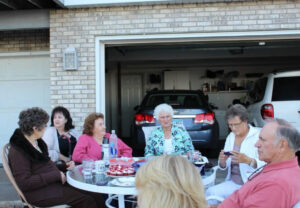
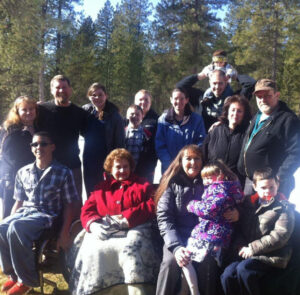 and Bev Schumacher, Carol Carlson, Bernice Hutchison, and several of their family members. Mom was so happy to see her relatives on that side of the family, who had become her close friends too.
and Bev Schumacher, Carol Carlson, Bernice Hutchison, and several of their family members. Mom was so happy to see her relatives on that side of the family, who had become her close friends too.
Mom had always said that she wouldn’t mind going to Heaven straight from church, and she almost did. On Thursday of that last week, we took Mom to dinner at Red Lobster (one of her favorite places). Then, on Sunday, we all went to church, as we always did, but this day was to be different. Mom’s sister, Evelyn Hushman was in the hospital. She had terminal Breast Cancer, and Mom wanted to get all of her remaining siblings to meet at the hospital to have lunch with Aunt Evelyn. They were all able to make it, except Aunt Dixie Richards. They all had a lovely lunch, and really enjoyed the visit. That night, Mom and my sister, Cheryl had a nice dinner and watched a movie. At 10:00pm, Mom said she was going to bed. Cheryl loaded the dishwasher and went in to take Mom her pills, but Mom would no longer be needing those pills, or any other pills. She was lying on the floor, peacefully. She had not fallen, because nothing was disturbed. She could not have laid down 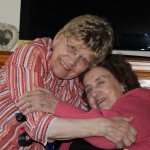
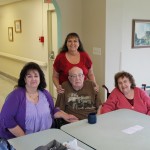 there by herself, because her knees would never have allowed that without disturbing everything in the room. You can say what you will, but we know that the angels carefully laid our mom down there on the floor, when they took her spirit to Heaven, because Mom was ready to go. She had been talking about it for weeks, if not months. I think she might have left during church, had it not been for the chance to say goodbye to her siblings. What a blessed way for a blessing of a lady to graduate to Heaven!! We love and miss you so much, Mom. Tell Dad we love and miss him too. You are in our future now, and we will see you both again someday.
there by herself, because her knees would never have allowed that without disturbing everything in the room. You can say what you will, but we know that the angels carefully laid our mom down there on the floor, when they took her spirit to Heaven, because Mom was ready to go. She had been talking about it for weeks, if not months. I think she might have left during church, had it not been for the chance to say goodbye to her siblings. What a blessed way for a blessing of a lady to graduate to Heaven!! We love and miss you so much, Mom. Tell Dad we love and miss him too. You are in our future now, and we will see you both again someday.
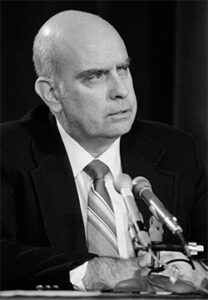
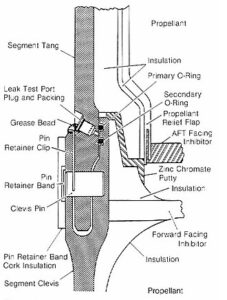 The Space Shuttle Challenger mission, named STS-51-L, was the twenty-fifth Space Shuttle flight and the tenth flight of Challenger. The crew was announced on January 27, 1985, and was commanded by Dick Scobee. Michael Smith was assigned as the pilot, and the mission specialists were Ellison Onizuka, Judith Resnik, and Ronald McNair. The two payload specialists were Gregory Jarvis, who was assigned to conduct research for the Hughes Aircraft Company, and Christa McAuliffe, who flew as part of the Teacher in Space Project. The mission was originally scheduled for July 1985, but was delayed to November and then to January 1986. The mission was scheduled to launch on January 22, but was delayed until January 28, 1986. This was definitely a “less than ideal” situation. Delay after delay, maybe should have raised a serious red flag, but somehow, it did not. At least not to the people who could have changed the outcome.
The Space Shuttle Challenger mission, named STS-51-L, was the twenty-fifth Space Shuttle flight and the tenth flight of Challenger. The crew was announced on January 27, 1985, and was commanded by Dick Scobee. Michael Smith was assigned as the pilot, and the mission specialists were Ellison Onizuka, Judith Resnik, and Ronald McNair. The two payload specialists were Gregory Jarvis, who was assigned to conduct research for the Hughes Aircraft Company, and Christa McAuliffe, who flew as part of the Teacher in Space Project. The mission was originally scheduled for July 1985, but was delayed to November and then to January 1986. The mission was scheduled to launch on January 22, but was delayed until January 28, 1986. This was definitely a “less than ideal” situation. Delay after delay, maybe should have raised a serious red flag, but somehow, it did not. At least not to the people who could have changed the outcome.
One man…Roger Boisjoly knew that the Challenger space shuttle might fail catastrophically at any time. There may have been others I suppose, but none that chose to try to take action. Boisjoly knew that every mission was an accident waiting to happen. Knowing that, he tried to stop the launch on January 28, 1986. He had a definite sick feeling about this mission, but NASA refused to acknowledge his objections. That fact amazes me!! Boisjoly was a rocket engineer who worked for a company that NASA contracted with. He had noticed that the Challenger’s booster rockets had a major design flaw. Their elastic seals had a tendency to stiffen and unseal in cold weather. I’m sure that most of NASA simply took for granted that there would not be much cold weather in Florida. Nevertheless, on this occasion, the Challenger was scheduled for a winter launch. The time had come, and Boisjoly knew that the temperatures would be too low for the booster rocket seals to handle, even in Florida. He convinced colleagues at his engineering company to formally recommend NASA delay the launch. They did, but NASA ignored that recommendation. It was a life altering, or life ending decision on NASA’s part. Most of us know that the rest is history. The launch took place, the seals failed, and the Challenger exploded less than two minutes after it launched. That day, because of the foolish stubbornness and arrogance of NASA, seven people lost their lives. The air temperature on that January 28 was predicted to be a record-low for a Space Shuttle launch. The air temperature was forecast to drop to 18° F overnight before rising to 22° F at 6:00am and 26° F at the scheduled launch time of 9:38am. For most of us, those temperatures wouldn’t seem 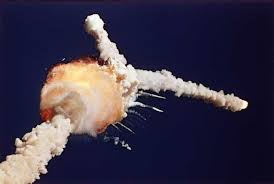
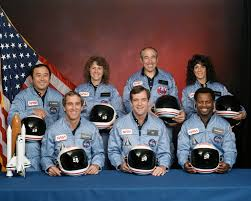 to be so severe, but for that little seal, it was very severe. Why couldn’t they have swallowed their pride, and postponed a little longer until the temperature warmed a bit. Were we really in that big a rush to start that mission, that we were willing risk the lives of seven people in the attempt. I love the space program and all that it has accomplished, but the people who made that choice that day were foolish and selfish.
to be so severe, but for that little seal, it was very severe. Why couldn’t they have swallowed their pride, and postponed a little longer until the temperature warmed a bit. Were we really in that big a rush to start that mission, that we were willing risk the lives of seven people in the attempt. I love the space program and all that it has accomplished, but the people who made that choice that day were foolish and selfish.
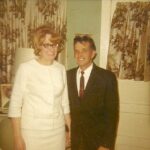
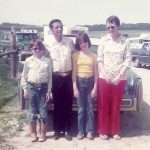 When my husband, Bob’s uncle, Bobby Cole comes to mind, I am taken back to the days when my girls, Corrie Petersen and Amy Royce, were little. Whenever we took a trip to see Bobby and Bob’s aunt, Linda Cole, we always had a great time. The girls got to play with their cousins, Sheila and Pat, and we enjoyed visiting and playing cards with Linda and Bobby. In those days, they lived in Kennebec, South Dakota. It was a tiny little town, with very little to do, so having visitors was a big deal to them.
When my husband, Bob’s uncle, Bobby Cole comes to mind, I am taken back to the days when my girls, Corrie Petersen and Amy Royce, were little. Whenever we took a trip to see Bobby and Bob’s aunt, Linda Cole, we always had a great time. The girls got to play with their cousins, Sheila and Pat, and we enjoyed visiting and playing cards with Linda and Bobby. In those days, they lived in Kennebec, South Dakota. It was a tiny little town, with very little to do, so having visitors was a big deal to them.
Linda and Bobby owned a hotel, and there were a few guests, but not really very many. It was like they owned a bed and breakfast…for us anyway. The rest of the guests had to go somewhere else for their breakfast. Bummer for them!! The visit was always so relaxing. The small-town feel was always there, and really, I loved it. I wouldn’t want to live in a small town all the time, but as an annual getaway, it was nice. I suppose it was the break from the everyday that held the majority of the appeal. We didn’t get to see Linda and Bobby much, so having the unhurried time to visit was a rare treat. They were always so full of laughter and fun.
A few years later, their hotel was struck by lightning during a summer storm, and it burned to the ground. After 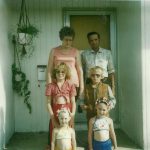
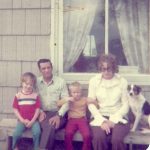 the fire, they made the decision to get out of the hotel business, and to get out of Kennebec. That was when they moved to Winnemucca, Nevada, and for the most part the annual trips stopped. Winnemucca was too far away to make it a weekend trip, like we could with Kennebec. I was always sorry to see those trips end. It was rather like the end of an era. The only thing that was more sad was when Bobby passed away, and then when Linda passed away. I will always miss them. They were a very fun couple. Today would have been Bobby’s 81st birthday. Happy birthday in Heaven, Bobby. We love and miss you very much.
the fire, they made the decision to get out of the hotel business, and to get out of Kennebec. That was when they moved to Winnemucca, Nevada, and for the most part the annual trips stopped. Winnemucca was too far away to make it a weekend trip, like we could with Kennebec. I was always sorry to see those trips end. It was rather like the end of an era. The only thing that was more sad was when Bobby passed away, and then when Linda passed away. I will always miss them. They were a very fun couple. Today would have been Bobby’s 81st birthday. Happy birthday in Heaven, Bobby. We love and miss you very much.
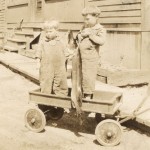
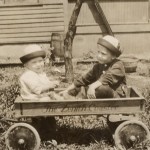 It’s hard for me to believe that my uncle, Bill Spencer has been in Heaven for more than three years already. Uncle Bill chose Christmas Day to go. I think maybe he wanted to spend the holiday with his parents and siblings. He was the last of the original family to go to Heaven, and with Covid stalking the world, he didn’t get to see his children as much either. Since Uncle Bill had Dementia, he probably didn’t realize that he didn’t get to see much of his family, but they knew it, and it made them sad. There were months and months during which they could not go visit him, and sadly it didn’t matter that all these precautions were taken. Uncle Bill still got Covid, and by Christmas Day, he was ready to go home. And so, on Christmas Day 2020, the Spencer brothers got back together again.
It’s hard for me to believe that my uncle, Bill Spencer has been in Heaven for more than three years already. Uncle Bill chose Christmas Day to go. I think maybe he wanted to spend the holiday with his parents and siblings. He was the last of the original family to go to Heaven, and with Covid stalking the world, he didn’t get to see his children as much either. Since Uncle Bill had Dementia, he probably didn’t realize that he didn’t get to see much of his family, but they knew it, and it made them sad. There were months and months during which they could not go visit him, and sadly it didn’t matter that all these precautions were taken. Uncle Bill still got Covid, and by Christmas Day, he was ready to go home. And so, on Christmas Day 2020, the Spencer brothers got back together again.
My dad, Allen Spencer was two years younger than his brother, Bill, but they were the very best of friends. When they were together, you didn’t have to ask them to talk about their childhood, all you have to do was sit back and listen, because the stories were the talk of the day. They had so many great adventures. They would go fishing, swimming, and boating with friends. They also loved getting into mischief, and dynamite was one of 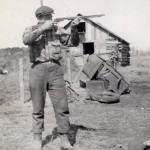
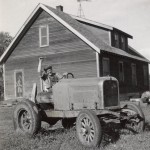 their favorite mischief makers. They normally used dynamite to remove tree stumps, but they weren’t above the Independence Day “fireworks” display or the “gate post” experiment. They were very industrious boys, and in those days, before things like video games, television (while it did exist, was not common in every household), and telephones (they were first in homes in 1856, but only 35% of homes in the 1920s had one), kids actually played outside, and used their imaginations. These brothers had the best time. They rode their bicycles for miles and miles. They hopped the trains…no, not like illegally. These boys had a pass, because their dad worked on the trains, but they never simply boarded a train…they hopped the train, even though they were scolded for it, they hopped the trains anyway. Danger be hanged!! Oh, the adventures they had.
their favorite mischief makers. They normally used dynamite to remove tree stumps, but they weren’t above the Independence Day “fireworks” display or the “gate post” experiment. They were very industrious boys, and in those days, before things like video games, television (while it did exist, was not common in every household), and telephones (they were first in homes in 1856, but only 35% of homes in the 1920s had one), kids actually played outside, and used their imaginations. These brothers had the best time. They rode their bicycles for miles and miles. They hopped the trains…no, not like illegally. These boys had a pass, because their dad worked on the trains, but they never simply boarded a train…they hopped the train, even though they were scolded for it, they hopped the trains anyway. Danger be hanged!! Oh, the adventures they had.
When the United States entered World War II, the brothers were all set to go into the Army Air Force together, but Uncle Bill had a hernia and flat feet, so they wouldn’t take him. My dad went in alone, and his big brother, who had always been there to take care of him, was…well, a little frantic about it. He didn’t want my dad to go 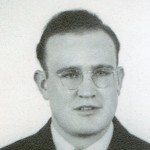
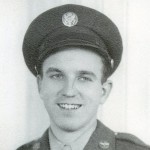 without him. He worried about his little brother. Sending any family member into the military in times of war, is something any family would worry about, and Uncle Bill was no exception. So, while his brother fought in the war, Uncle Bill worked on the planes here at home. Uncle Bill was a welder, and his skills were very important in the building of the planes that would fight and eventually win World War II. His was a very important job, and I am very proud of the part he played in the victory. Today would have been Uncle Bill’s 102nd birthday. Happy birthday in Heaven, Uncle Bill. We love and miss you very much.
without him. He worried about his little brother. Sending any family member into the military in times of war, is something any family would worry about, and Uncle Bill was no exception. So, while his brother fought in the war, Uncle Bill worked on the planes here at home. Uncle Bill was a welder, and his skills were very important in the building of the planes that would fight and eventually win World War II. His was a very important job, and I am very proud of the part he played in the victory. Today would have been Uncle Bill’s 102nd birthday. Happy birthday in Heaven, Uncle Bill. We love and miss you very much.

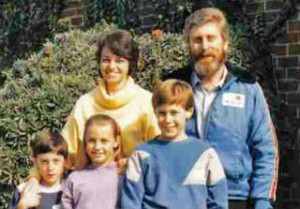 Any illness that takes a life is a tragedy, but sometimes an illness doesn’t take the life, exactly, it just stops everything about that life…in its tracks. In January of 1988 at age 12, Martin Pistorius of South Africa came down with a strange illness. his illness was so unusual, that his doctors weren’t even sure what it was. Nevertheless, they did speculate that it might be Cryptococcal Meningitis. Cryptococcosis is a potentially fatal fungal infection of mainly the lungs, where it presents as a type of pneumonia; and also, the brain, where it appears as a meningitis. The symptoms seem common enough…a cough, difficulty breathing, chest pain, and fever are seen when the lungs are infected. When the brain is infected, symptoms include headache, fever, neck pain, nausea and vomiting, light sensitivity, and confusion or changes in behavior. It can also affect other parts of the body including skin, where it may appear as several fluid-filled nodules with dead tissue.
Any illness that takes a life is a tragedy, but sometimes an illness doesn’t take the life, exactly, it just stops everything about that life…in its tracks. In January of 1988 at age 12, Martin Pistorius of South Africa came down with a strange illness. his illness was so unusual, that his doctors weren’t even sure what it was. Nevertheless, they did speculate that it might be Cryptococcal Meningitis. Cryptococcosis is a potentially fatal fungal infection of mainly the lungs, where it presents as a type of pneumonia; and also, the brain, where it appears as a meningitis. The symptoms seem common enough…a cough, difficulty breathing, chest pain, and fever are seen when the lungs are infected. When the brain is infected, symptoms include headache, fever, neck pain, nausea and vomiting, light sensitivity, and confusion or changes in behavior. It can also affect other parts of the body including skin, where it may appear as several fluid-filled nodules with dead tissue.
As the disease progressed, Pistorius got progressively worse. At first, he lost the ability to move by himself, then his ability to make eye contact, and finally his ability to speak. His parents were told their son was essentially in a vegetative state, basically they were told he was almost brain dead, that he wasn’t “really there” and would die soon. It was the most devastating news a parent could hear, but Pistorius didn’t die. He just stayed in a vegetative state for the next 12 years. His parents couldn’t give up on their son, and so, they took care of him…bathing, dressing, and feeding him. They days turned into years…years of grieving, sadness, weariness, and a sense of having made a mistake, for not “letting him go” sooner. The weariness got so bad that one day, not knowing her son could hear her, Joan Pistorius told him, “I hope you die.” It was a harsh thing to say, but she thought he was brain dead, and she was simply exhausted.
As Joan Pistorius would later find out, to her horror I’m sure, her son heard and understood every word. Somewhere between the ages of 14 and 16, Pistorius had begun to wake up…slowly. At first, it may have been barely noticeable, but at some point, it got to where Pistorius later recalled, “I was aware of everything, just like any normal person.” He could hear, and very much understand and process what he heard, but he couldn’t say or do anything about what he heard or let anyone know that he had heard. The condition Pistorius had, is known as “locked-in syndrome” and can be caused by a stroke, traumatic brain injury, infection, or drug overdose. There is no known cure. I’m sure the situation was even more frustrating for Pistorius, than it was for his mom. Although Pistorius could see, hear, and understand everything, he couldn’t move his body. “Everyone was so used to me not being there that they didn’t notice when I began to be present again,” he later recalled. “The stark reality hit me that I was going to spend the rest of my life like that – totally alone.”
Pistorius made a conscious choice to disengage from his thoughts as his way of coping. Because of his condition, Pistorius spent a lot of time at a care center while his mother worked. He hated the children’s TV show Barney, and that was on constantly there. That show led him to start reengaging with his thoughts in an attempt to take some control of his life. As his thought life improved, so did his body. Then, one glorious day, a relief worker at his daycare center noticed his slight movements and realized Pistorius could communicate. She immediately told his parents, telling them to get another evaluation. Finally, they knew he was conscious. His 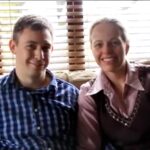
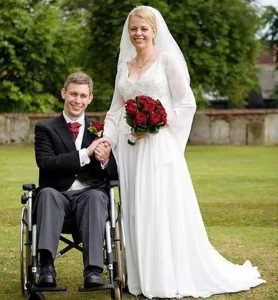 recovery wasn’t instantaneous, of course, but by age 26, he could use a computer to communicate. Pistorius later enrolled in college, majoring in computer science and started a company online. It was a long road, but he has come full circle, by 2011 when he published his memoir, “Ghost Boy.” Pistorius met his wife Joanna, who is from England in 2008 through his sister Kim, who had moved to there. After meeting Joanna, he moved to England too, and they were married in 2009. By that time, while still using a wheelchair, he was racing in it. Their son, Sebastian Albert Pistorius, was born a few months later.
recovery wasn’t instantaneous, of course, but by age 26, he could use a computer to communicate. Pistorius later enrolled in college, majoring in computer science and started a company online. It was a long road, but he has come full circle, by 2011 when he published his memoir, “Ghost Boy.” Pistorius met his wife Joanna, who is from England in 2008 through his sister Kim, who had moved to there. After meeting Joanna, he moved to England too, and they were married in 2009. By that time, while still using a wheelchair, he was racing in it. Their son, Sebastian Albert Pistorius, was born a few months later.
 It’s a sad thing when someone dies with no next of kin…no friends or loved ones to see to funeral arrangements, last wishes, or even, to attend the funeral. I suppose for the most part, the unfortunate departed one would probably be cremated and no funeral would be held…at least in most places that would be the case. That seems even more sad than someone who lived their last days alone, with no friends and no family. It’s almost like being thrown away.
It’s a sad thing when someone dies with no next of kin…no friends or loved ones to see to funeral arrangements, last wishes, or even, to attend the funeral. I suppose for the most part, the unfortunate departed one would probably be cremated and no funeral would be held…at least in most places that would be the case. That seems even more sad than someone who lived their last days alone, with no friends and no family. It’s almost like being thrown away.
In Amsterdam, however, they just can’t stand the thought of such a sad end to such a sad life. So, they began a tradition. In a heart-warming tribute to those lost souls who pass without any next of kin or friends, a poet will write a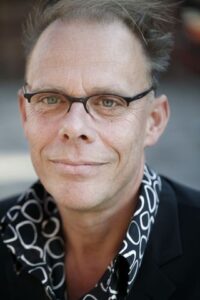 poem and even recite it at the funeral. What an incredible act of kindness and compassion!! These poets are not paid for their services, and yet they take to time to write a poem specifically for the newly departed person, even though the poet never knew the departed.
poem and even recite it at the funeral. What an incredible act of kindness and compassion!! These poets are not paid for their services, and yet they take to time to write a poem specifically for the newly departed person, even though the poet never knew the departed.
Frank Starik leads a group of poets in Amsterdam. These poets attend the funerals of the city’s “unmourned” dead, remembering them with a specially composed poem. “I want to give them back a life, a history” he told Reuters reporter Alexandra Hudson. The social services in Amsterdam bury around 250 people a year, and about 15 of those depart with no trace of relatives or friends. For most of us that seems unheard of and shocking, but I suppose that these people are often buried or cremated with little fanfare, so we rarely hear anything about them, but these are the cases closely watched by the poet group, so they can step in and give their own tribute and a labor of compassion and love for a person who had no one to love them. While the poets write their poems, the city contributes by providing a coffin, bouquet of flowers, and even plays music 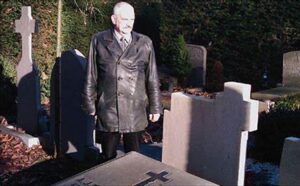 best guessed to be the deceased’s choice of music. I’m not sure how they know what music to use, but maybe they look at the things in the deceased’s home, or anything else like name the wearing of a cross. I love these acts of kindness, and what social worker told Reuters when he said, “Everyone in Amsterdam – rich or poor – should have a dignified funeral, with flowers, with coffee and some thoughts about their life. We are not responsible for how they lived, but we are responsible for them in death, and if they died in Amsterdam then they are one of us.” I can’t think of an act of kindness that is more touching than this. Well done, Amsterdam. Well done.
best guessed to be the deceased’s choice of music. I’m not sure how they know what music to use, but maybe they look at the things in the deceased’s home, or anything else like name the wearing of a cross. I love these acts of kindness, and what social worker told Reuters when he said, “Everyone in Amsterdam – rich or poor – should have a dignified funeral, with flowers, with coffee and some thoughts about their life. We are not responsible for how they lived, but we are responsible for them in death, and if they died in Amsterdam then they are one of us.” I can’t think of an act of kindness that is more touching than this. Well done, Amsterdam. Well done.

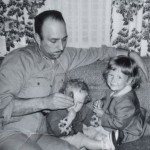 Somehow, this year, this day sneaked up on me. I knew what day my dad, Allen Spencer passed away, and I knew it was coming up, but then…suddenly, yesterday as I was working on my computer, I realized that it was tomorrow, and it hit me like a kick in the gut. I hate that. I prefer to be prepared for the coming of this day and other days like this, so I can steel my emotions to it. It seems impossible that my dad has been in Heaven for 16 years now. There are great grandchildren and great great grandchildren that he never got to meet. There are so many new additions by marriage that he did get to meet…and more than that, they didn’t get to meet him. That is sad indeed, because my dad loved playing with the little kids…hearing their laughter was his delight. He would have loved all of the new spouses too. We have been very blessed with all of them.
Somehow, this year, this day sneaked up on me. I knew what day my dad, Allen Spencer passed away, and I knew it was coming up, but then…suddenly, yesterday as I was working on my computer, I realized that it was tomorrow, and it hit me like a kick in the gut. I hate that. I prefer to be prepared for the coming of this day and other days like this, so I can steel my emotions to it. It seems impossible that my dad has been in Heaven for 16 years now. There are great grandchildren and great great grandchildren that he never got to meet. There are so many new additions by marriage that he did get to meet…and more than that, they didn’t get to meet him. That is sad indeed, because my dad loved playing with the little kids…hearing their laughter was his delight. He would have loved all of the new spouses too. We have been very blessed with all of them.
My dad and my mom, Collene Spencer gave us all such a beautiful life. They built in us a deep faith in God and a deep sense of family. They are both in Heaven now, but in our memories live the echos of those beautiful moments. Dad always loved to travel, and that started many family vacations. Sometimes, my parents were 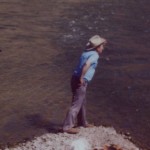
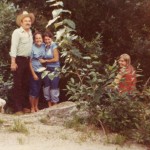 happy to plan a long vacation, and sometimes, they would just load up the car and go where the road would take us. I suppose people might think that was a weird way to travel, but those were some of the most amazing trips ever. My sisters and I can say that we have visited almost every state in the nation. We took a trip every summer…even in the lean years. I will never forget the “Wyoming Tour” when we took several legs and traveled to each of the four sections of the state. Sometimes, like that year, a tour of our home state was just what we needed, and it was very relaxing and fun.
happy to plan a long vacation, and sometimes, they would just load up the car and go where the road would take us. I suppose people might think that was a weird way to travel, but those were some of the most amazing trips ever. My sisters and I can say that we have visited almost every state in the nation. We took a trip every summer…even in the lean years. I will never forget the “Wyoming Tour” when we took several legs and traveled to each of the four sections of the state. Sometimes, like that year, a tour of our home state was just what we needed, and it was very relaxing and fun.
My dad was a gentle man, as well as a gentleman. I truly think that it was harder on him to discipline is that it was on us. Dad would do his best to try to work things out without the spanking we most likely deserved. I remember so many times that Dad kept the peace in our family. We were never allowed to “let the sun go down on our wrath.” Dad knew that it was essential to say you’re sorry and make up with your loved ones. He family struggled with that, and it caused splits in the family…with everyone but my dad. He got along with all of his 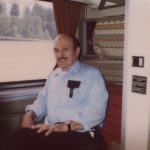
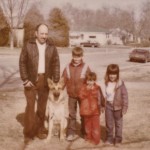 siblings. He refused to let it be otherwise. Dad believed in being the peacemaker. And he always was. That was probably one of the greatest and most important lessons ever. I wish my dad was still with us. I miss his teachings, his personality, his gentleness, and his kindness, not to mention his silliness, and he was able to be quite silly. I really miss that too. Today, marks 16 long years without seeing my dad. It is a kick in the gut, and I can’t wait to see him again when I go to Heaven. We love and miss you every day, Dad. Tell Mom we love and miss her too. Hugs to you both.
siblings. He refused to let it be otherwise. Dad believed in being the peacemaker. And he always was. That was probably one of the greatest and most important lessons ever. I wish my dad was still with us. I miss his teachings, his personality, his gentleness, and his kindness, not to mention his silliness, and he was able to be quite silly. I really miss that too. Today, marks 16 long years without seeing my dad. It is a kick in the gut, and I can’t wait to see him again when I go to Heaven. We love and miss you every day, Dad. Tell Mom we love and miss her too. Hugs to you both.
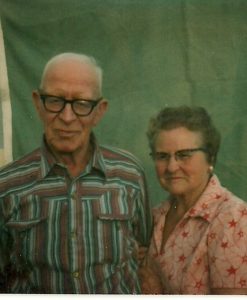
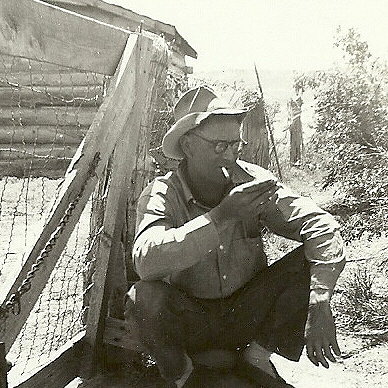 My husband’s grandfather, Robert Knox was a hardworking man all his life. When I first met him, he was already retired, of course. Nevertheless, he was still working hard. Grandpa was the keeper of the vegetable garden. We all benefitted from the vegetable garden, but it was Grandpa who kept the garden. I got involved in some of the harvesting…we all did, but I don’t think Grandpa would have appreciated it if we tried to get out there and “tend” the garden. That was his domain, and you really should stay away from it. Seriously though, Grandpa loved his vegetable garden. It got his outside and kept him busy. He would probably have been bored silly without it…and Grandma would have had to figure out what to do with him if he was bored silly.
My husband’s grandfather, Robert Knox was a hardworking man all his life. When I first met him, he was already retired, of course. Nevertheless, he was still working hard. Grandpa was the keeper of the vegetable garden. We all benefitted from the vegetable garden, but it was Grandpa who kept the garden. I got involved in some of the harvesting…we all did, but I don’t think Grandpa would have appreciated it if we tried to get out there and “tend” the garden. That was his domain, and you really should stay away from it. Seriously though, Grandpa loved his vegetable garden. It got his outside and kept him busy. He would probably have been bored silly without it…and Grandma would have had to figure out what to do with him if he was bored silly.
Grandpa was blessed on his 67th birthday with the coolest birthday gift ever…the birth of his third great granddaughter, Machelle (Cook) Moore. Grandma had been given that blessing with their first great granddaughter, Corrie (Schulenberg) Petersen, and Grandpa really wanted the same gift. A year and 5 months later, he was so blessed…and so happy. Sharing a birthday with a child, grandchild, or great grandchild is something that doesn’t happen for just anyone, so those who are so blessed, usually know just how rare a treat that is. Not very many people get to have that, and to have two in one couple is really rare.
Grandpa loved to read. He had a stack of books that was usually taller than he was. The funny thing was that he would read several at one time, and he could totally keep up with the story line on all of them. Western were his book of choice, which is typical for his era. He was born in 1908, and in during that and they subsequent eras, westerns were pretty much what was out there. I don’t know what he would think of some of the book of 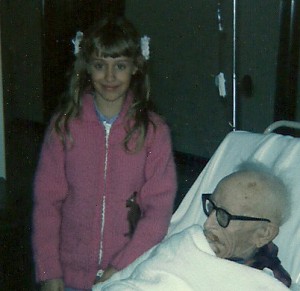
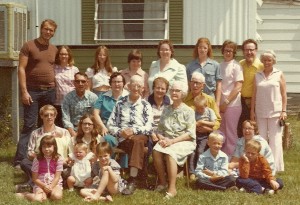 our time, but my guess is that he wouldn’t have liked them very much. I can’t say that I necessarily care much for most of them either. While we were two generations apart, and he probably though I was a silly girl when I first met him when I was just 17 years old, I grew to love that old man. Sadly, he died of cancer in 1985, when he was far too young. He was just 77 years old. Today is the 115th anniversary of Grandpa’s birth. Happy birthday in Heaven, Grandpa Knox. We love and miss you very much.
our time, but my guess is that he wouldn’t have liked them very much. I can’t say that I necessarily care much for most of them either. While we were two generations apart, and he probably though I was a silly girl when I first met him when I was just 17 years old, I grew to love that old man. Sadly, he died of cancer in 1985, when he was far too young. He was just 77 years old. Today is the 115th anniversary of Grandpa’s birth. Happy birthday in Heaven, Grandpa Knox. We love and miss you very much.


